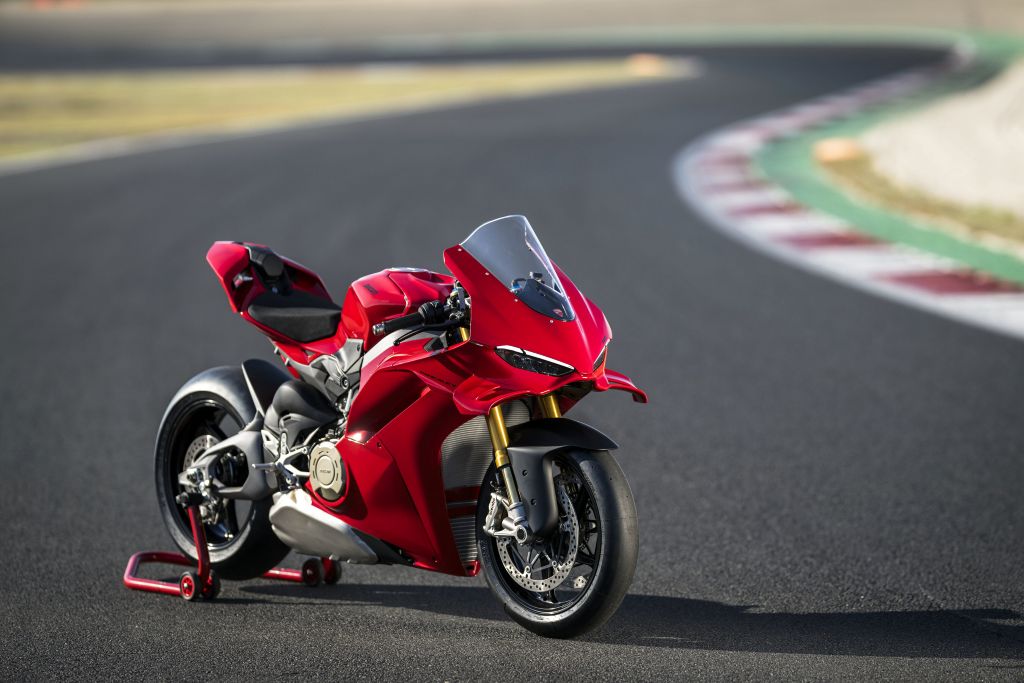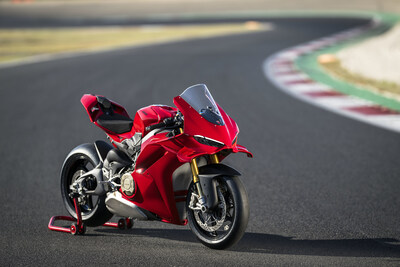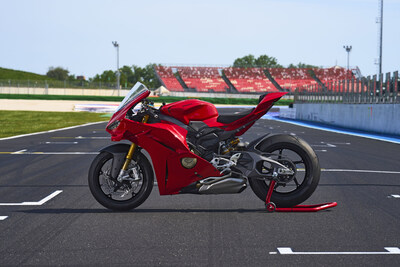New Ducati Panigale V4: wonder engineered

With the new 2025 Panigale V4, Ducati has pushed the limits of sport bikes even further. Born from developing the bike that won the Superbike World Championship for two consecutive years, the new Panigale V4 has undergone a complete redesign focusing on technological improvements and ergonomic enhancements—taking advantage of data from Ducati Corse, improvements of tires, aerodynamics, and electronics.
A true engineered marvel.


“Ducati’s mission is to enrich people’s lives through technologically sophisticated motorcycles characterized by sensual beauty,” declared Claudio Domenicali when presenting the bike during the Ducati World Premier. “Few bikes like the new Panigale V4, the seventh generation of Ducati Superbikes, achieve this mission. It’s a motorcycle that continues a history of success and lineage of iconic models which represents our values of Style, Sophistication and Performance.”
Thanks to innovative electronic technologies, largely derived from MotoGP, the new Panigale V4 is a motorcycle that allows riders the utmost confidence as if they were a professional rider on a closed track. Whether it’s the V4 engine with desmodromic distribution and counter-rotating shaft, or chassis and electronics that are similar to those of the official Desmosedici GPs.
This generation of the Panigale V4 has closely followed the path inspired by Ducati in MotoGP racing competition, where its engine, the Desmosedici, has become the most desired bike in the category. An engine which, in 2023, saw seven out of eight riders win at least one race.
Pricing
United States:
| Panigale V4 | Ducati Red | $25,995 |
| Panigale V4 S | Ducati Red | $33,895 |
Deliveries of the new models are expected to arrive in the United States starting November 2024.
Panigale V4
- Color
- Ducati Red with Urban Grey frame and black rims
- Main standard equipment
- Desmosedici Stradale engine, 1,103 cc
- Maximum power of 209 hp at 13,500 rpm
- Maximum torque of 89.5 -ft lbs at 11,250 rpm
- “Front Frame” chassis
- 4.4-gallon aluminum fuel tank
- 43 mm Showa Big Piston Fork (BPF), fully adjustable
- Sachs mono-shock absorber, fully adjustable
- Sachs steering damper
- Braking system with Brembo HypureTM monobloc calipers
- Pirelli Diablo Supercorsa V4 tires with 200/60 rear
- Wings with biplane configuration and integrated design
- Latest generation electronic package with 6-axis Inertial Measurement Unit (6D IMU): Race eCBS with cornering functionality; Ducati Traction Control (DTC) DVO; Ducati Slide Control (DSC); Ducati Wheelie Control (DWC) DVO; Ducati Power Launch (DPL); Ducati Quick Shift (DQS) 2.0; Engine Brake Control (EBC), Ducati Vehicle Observer (DVO)
- Buttons for quickly changing levels
- New 6.9″ full-TFT dashboard with 8:3 aspect ratio
- Riding Mode (Race A, Race B, Sport, Road, Wet)
- A single-seat configuration, passenger kit is available as an accessory.
- Predisposition for Ducati Data Logger (DDL) and Ducati Multimedia System (DMS)
Panigale V4 S
- Color
- Ducati Red with Urban Grey frame and black rims
- Standard equipment like Panigale V4, except for
- Ducati Electronic Suspension (DES) 3.0
- Öhlins NPX-30 fork with Öhlins Smart EC 3.0 control system
- Öhlins TTX 36 shock absorber with Öhlins Smart EC 3.0 control system
- Öhlins steering damper with Öhlins Smart EC 3.0 control system
- Forged aluminum rims
Ergonomics
The ergonomics of the motorcycle have been the subject of in-depth study and development by Ducati engineers in collaboration with the Ducati Centro Stile, with the aim of improving control of the motorcycle in the most important phases of track riding and allowing the rider to make the most of the performance of the Panigale V4 both on a single lap and during a prolonged session. Room to move dynamically has improved, now better accommodating riders of all sizes and facilitating sporty riding with marked improvements when the body moves towards the inside of the motorcycle when cornering (“hanging off”).
The main changes concern the seat and the tank, which have been redesigned. The saddle now has a wider shape, and the area with black texture in the contact points of the rider’s thighs and knees with the tank is characterized by a texture that allows easier movements of the body when moving the body backward, reducing at the same time the tendency for the rider to move forward under braking. The fuel tank has a new shape, which offers a completely different fit area compared to the previous version. All this allows riders of all sizes to better anchor themselves when braking, putting less strain on their arms and allowing them to ride faster and for longer. Thanks to these new ergonomics, the rider is also incorporated better into the motorcycle and is therefore more comfortable and protected when riding in a straight line.
The new footrests have the gear and brake levers mounted on bearings instead of sliding bushings to eliminate play and reduce friction. This increases riding sensitivity, especially on the gearbox side, amplified by the benefits guaranteed by the new DQS system control.
To improve the rider’s feeling when opening and handling the throttle, the new Panigale V4 adopts the same control as the V4 R, which is 50% more compact and features minimal radial and axial play, virtually reducing freeplay in the stroke.
Engine
The Panigale V4 2025 is equipped with the 1,103 cc Desmosedici Stradale engine. At the same time, polluting and noise emissions are reduced, and performance is increased, with a maximum power of 209 hp (155 kW) at 13,500 rpm. This result is obtained thanks to various evolutions in the internal components, which offer an overall superior performance. The engine’s weight is also reduced by 2.2 lbs, which has important benefits in terms of reducing inertia.
Power and torque can increase further, reaching 228 hp and 94.2 ft-lbs, respectively, by fitting the Ducati Performance full-racing exhaust by Akrapovič.*
New Ducati Hollow Symmetrical Swingarm
The rear suspension uses a linkage fixed to the Desmosedici Stradale engine via a forged aluminum element. The linkage reacts to the movements imparted by a double-sided low-pressure shell-cast aluminum swingarm, characterized by a design that combines the rigidity and feedback requirements of Ducati Corse with the choice of keeping the exhaust system positioned under the engine on the production bike.
The choice of a double-sided layout for the swingarm was born from the desire to further increase engine and chassis performance which is now so close to the prototypes as to require similar solutions to exploit it, accommodating lean angles permitted by modern tires now well over 60°, at which the suspensions fail to work properly.
In 2022, Francesco Bagnaia, riding a Panigale V4 S equipped only with slick tires, set the best time in the Race of Champions in 1’35″8, four seconds away from the MotoGP record of that year, 1’31″868, established by Enea Bastianini on a Ducati DesmosediciGP. To get even closer to the performance of the MotoGP bike, in agreement with Ducati Corse, it was decided to adopt the same scheme for the swingarm, working with the designers of the Centro Stile to give the piece the stylistic refinement typical of all Ducatis.
The new Ducati Hollow Symmetrical Swingarm is characterized by having lateral arms with a lighter design and large slots on the sides, with a hollowed-out internal box structure for greater lightness. The chain tensioner slider on the left side is made from forged aluminum to withstand the loads resulting from the chain pull. The lateral stiffness is reduced (-37% compared to the previous single-sided unit) as is the weight, thanks to the two large lightening slots, improving traction and rider feel when accelerating out of corners. The forged suspension/forged swingarm/rear rim assembly weighs 7.2 lbs less than its predecessor and is more effective in releasing power to the ground.
The swingarm wheelbase is 24.3-in., an increase of .62-in. compared to the single-sided swingarm mounted on the previous Panigale V4. It is defined to rebalance the load on the front end following the greater longitudinal thrusts made possible thanks to the greater mechanical grip of the rear. Traction is therefore improved, as is trajectory stability when exiting corners.
Braking system with new Brembo Hypure® calipers
The Panigale V4 range features the brand new, powerful Brembo Hypure® monobloc calipers which represent an evolution of the already high-performance Stylema®. Compared to the latter, the Hypure® reduces the weight – already a benchmark in the segment – by 30 g per caliper thanks to their innovative asymmetric design without compromising rigidity. This greater lightness guarantees an increase in the nimbleness of the motorcycle thanks to the reduction in unsprung masses, thus reducing rider effort when entering corners and changing direction.
Ducati Vehicle Observer (DVO)
The controls dedicated to the Ducati Traction Control (DTC) and Ducati Wheelie Control (DWC) received an updated algorithm, developed by Ducati Corse, called Ducati Vehicle Observer (DVO). This algorithm allows an instant estimate of physical, kinematic, and dynamic quantities that cannot be measured in practice, which impact the ground forces, accelerations, and maximum torques that the vehicle can bear in various riding conditions.
The system effectively monitors the Panigale V4 using sensors capable of measuring seventy physical quantities in addition to those detected by the IMU. This allows a precise estimate of both the operating thrusts and the maximum forces that the bike can tolerate at that specific moment.
Thanks to the additional data calculated by the DVO, the DTC and DWC controls can define the slip and wheelie angles with much greater precision than what occurred using only the data provided by the inertial platform. This allows the controls to intervene using a predictive mode, allowing the rider to exploit the motorcycle with more confidence.
Thanks to the DVO, it is now possible to implement a Grip Level Meter tool, a feature integrated with the dedicated software when using slick tires. Reserved for use on the track, the Grip Level Meter provides the rider with an indication on the dashboard estimating the instant grip available. The Grip Level Meter helps the rider evaluate the conditions of the asphalt and know when to replace the tires.
MotoGP dashboard
The dimension of 6.9″ with an 8:3 aspect ratio offers maximum readability without interfering with vision through the windshield in the fairing position. The protective glass uses Optical Bonding technology to ensure optimal readability on a black background, even during the day.
On the new Panigale V4, the sensation of being on a Desmosedici GP is reinforced by the new Track display on the dashboard. Thanks to the size and “wide” form factor of the new dashboard, a series of new parameters can be displayed on one side of the screen:
- “g-Meter,” which indicates in real time the value of lateral acceleration when leaning and longitudinally during acceleration and braking.
- “Power & Torque,” which displays the percentage of power and torque delivered at that moment compared to the maximum values available given the gear engaged.
- “Lean angle,” which shows the instantaneous lean angles accompanied by the level of throttle opening and the pressure exerted on the brake.
The Info Mode Track can display chronological performance in real time. Taking advantage of the GPS system, the dashboard displays lap times, and is capable of handling three splits, which can be set by the rider using the flash button during the first session. The dashboard displays the split time’s table, with T1, T2, or T3 icons indicating the performance obtained in that sector of the track using the same color codes – white, grey, orange, red – used in MotoGP.
Upon returning to the pits, the new DDL data acquisition completes the official rider experience. The system, developed by 2D in collaboration with Ducati, records all the parameters relevant for riding from the Panigale’s CAN bus line, cross-referencing them with a state-of-the-art GPS system capable of drawing the trajectories traveled with great precision. The data can then be analyzed using external software with templates and reports created by Ducati Corse, to perfect your performance on the track.
(*) Component not homologated for road circulation, reserved for track use.





